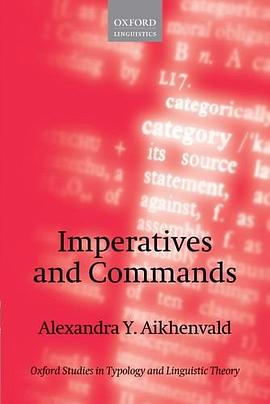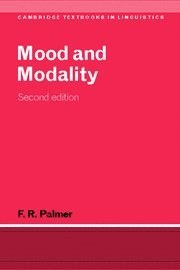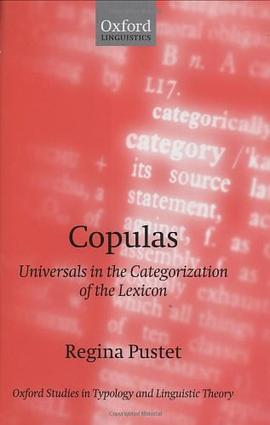

具体描述
This is the first cross-linguistic study of imperatives, and commands of other kinds, across the world's languages. It makes a significant and original contribution to the understanding of their morphological, syntactic, semantic, and pragmatic characteristics. The author discusses the role imperatives and commands play in human cognition and how they are deployed in different cultures, and in doing so offers fresh insights on patterns of human interaction and communication. Alexandra Aikhenvald examines the ways of framing commands, or command strategies, in languages that do not have special imperative forms. She analyses the grammatical and semantic properties of positive and negative imperatives and shows how these correlate with categories such as tense, information source, and politeness. She looks at the relation of command pragmatics to cultural practices, assessing, for example, the basis for Margaret Mead's assumption that the harsher the people the more frequently they use imperatives. Professor Aikhenvald covers a wide range of language families, including many relatively neglected examples from North America, Amazonia, and New Guinea. The book is accompanied by illustrations of some conventional command signs. Written and presented with the author's characteristic clarity, this book will be welcomed by linguists of all theoretical persuasions. It will appeal to social and cultural anthropologists and cognitive and behavioural scientists.
作者简介
目录信息
读后感
评分
评分
评分
评分
用户评价
这本书的魅力在于其近乎病态的客观性。作者像一个冷眼旁观的记录者,记录着人类在面对巨大系统性压力时的反应,却没有给出任何道德评判或情感倾向。读到某些部分,我感到一种强烈的疏离感,仿佛我正在阅读一份关于另一个物种的田野调查报告,而不是一个关于“人”的故事。这种冷静的处理方式,反而使得那些潜藏在平静表面下的巨大悲剧显得更加触目惊心。尤其是在描述社会阶层固化和个体抗争无力的章节,作者的笔触如同冰冷的钢尺,精确地丈量着希望与绝望之间的距离。此外,书中对科学术语的运用非常大胆且精确,这些术语并非装饰,而是构建故事世界观的基石。这本书探讨的不是个人命运,而是宏大结构如何塑造和碾碎个体的过程,读完后,那种无力感会伴随你很久。
评分这部书的叙事结构实在令人拍案叫绝,作者似乎对时间的线性流动有着一种近乎戏谑的态度。它不是那种老老实实地从头讲到尾的故事,而是像一个精密的万花筒,将不同时空碎片以一种看似随机却又暗含深意的方式拼凑在一起。读起来,你仿佛置身于一团迷雾之中,每一个转折都带着一丝清冷而疏离的美感。书中人物的内心挣扎被描绘得淋漓尽致,那种深植于骨髓的孤独感,即使在最喧闹的场景中也挥之不去。我特别欣赏作者在环境描写上的细腻,那种对光影、对气味、对细微声响的捕捉,构建了一个真实到让人感到压抑的世界。然而,正是这种压抑,反衬出那些转瞬即逝的美丽瞬间,如同夜空中划过的流星,短暂却震撼人心。这本书更像是一种体验,一种对“存在”意义的模糊探寻,它不给你明确的答案,而是提供了一片广阔的思辨空间,让人在合上书页后,仍久久沉浸其中,回味无穷。
评分如果说文学是一门艺术,那么这部作品就是一幅大胆的、后现代主义的拼贴画。它拒绝单一视角的叙事,而是将多重视角、日记片段、官方文件乃至虚构的学术论文碎片混杂在一起。这种手法在初期阅读时确实造成了不小的阅读障碍,我花了很大力气才辨认出哪些是真实叙述,哪些是角色基于自身偏见构建的“现实”。但一旦适应了这种跳跃和错位,你会发现作者正在玩弄的,是一种关于“真相”本质的把戏。书中关于历史记载的不可靠性进行了深刻的探讨,那些被公认为事实的叙事,在作者的解构下,显得如此脆弱不堪。最让我印象深刻的是它对“沉默”的描绘——那些未被写下、未被说出的东西,占据了比所有文字都更重要的分量。这是一种非常“智力密集型”的阅读体验,它考验的不是你的耐心,而是你接受悖论和复杂性的能力。
评分这本书的节奏控制极其令人不安,它像一首变奏曲,在平稳的行进中突然插入尖锐的不和谐音。角色之间的互动充满了张力,但这种张力并非源于直接的冲突,而是源于彼此间无法沟通的隔阂和对同一事件的不同解读。作者非常擅长利用留白,很多关键情节的处理都是点到为止,留给读者自行脑补后续,这既是优点也是缺点——优点是赋予了读者参与感,缺点是偶尔会让人感到信息缺失的焦灼。我注意到,全书中反复出现的主题似乎是关于“身份的流动性”:人物在不同的社会角色之间摇摆不定,他们的本质似乎从未被固定过。这种探索,在某些章节达到了近乎迷幻的境地,文字本身似乎都在试图挣脱意义的束缚。对于那些期待清晰情节线索和明确人物动机的读者,可能会感到困惑,但对于热衷于文本深层结构分析的文学爱好者,这将是一场盛宴。
评分我必须承认,这本书的文字功力简直是教科书级别的,但这种“功力”带来的阅读体验是极其挑战性的。作者的句式往往拉得很长,充满了复杂的从句和罕见的词汇,使得初读时不得不放慢速度,甚至需要反复回味才能捕捉到其精确的含义。它探讨的主题非常宏大且抽象,涉及哲学、历史乃至符号学,对于习惯了快节奏叙事的读者来说,这无疑是一次精神上的“马拉松”。我尤其欣赏其中穿插的那些关于艺术史的论述,它们并非简单地罗列事实,而是被巧妙地编织进了人物的对话和思考之中,成为推动情节发展的隐形力量。书中对“记忆”的解构尤其深刻,作者似乎在不断提醒我们,我们所认知的一切,都建立在一个极其脆弱且易逝的基础上。总而言之,这是一部需要沉下心来、带着批判性思维去啃读的作品,它不迎合大众,但回报给耐心的读者的是思想上的极大富足。
评分英语的东西太多,什么规律都一定是适用于英语的。
评分英语的东西太多,什么规律都一定是适用于英语的。
评分英语的东西太多,什么规律都一定是适用于英语的。
评分英语的东西太多,什么规律都一定是适用于英语的。
评分英语的东西太多,什么规律都一定是适用于英语的。
相关图书
本站所有内容均为互联网搜索引擎提供的公开搜索信息,本站不存储任何数据与内容,任何内容与数据均与本站无关,如有需要请联系相关搜索引擎包括但不限于百度,google,bing,sogou 等
© 2026 book.wenda123.org All Rights Reserved. 图书目录大全 版权所有




















